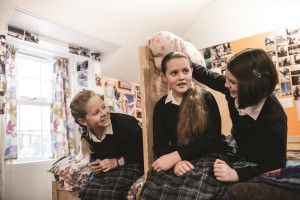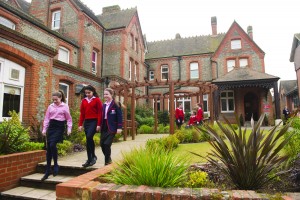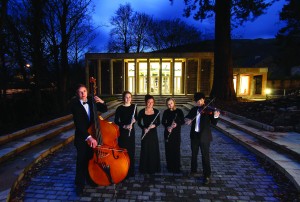The best qualities of family life are replicated in the boarding house family, as John Dunston, former Head of Leighton Park School, explains
 ‘It already seems like a second home to me.’ How often phrases like this are heard from pupils fortunate enough to benefit from today’s boarding experience. And listening to the boarders as they return from their holidays, and from all over the world, it is clear that they mean it.
‘It already seems like a second home to me.’ How often phrases like this are heard from pupils fortunate enough to benefit from today’s boarding experience. And listening to the boarders as they return from their holidays, and from all over the world, it is clear that they mean it.
The excitement of reunions with friends; the eager anticipation as boys and girls personalise their own areas of the boarding house again; the explosion of laughter and life as another busy term gets under way – these are moments to be cherished, which would delight any parent. Often we hear fathers or mothers exclaim: ‘Ah, if only I could board at school now – they have such fun!’ Or even occasionally: ‘You don’t have room for parents too, do you?’
The quality of the boarding experience today is enriching and stimulating. Enormous investment in boarding facilities by schools has given current and future pupils a standard of accommodation undreamt of in the past. Leisure and study facilities in the boarding house promote both a sense of community and a growth in independence, as pupils progress from childhood to adulthood in a wonderfully caring environment. And the best qualities of family life are replicated in the family of the boarding house: there is a sense of shared purpose, shared fun and mutual respect.
Life in the boarding house
Today’s boarding schools are warm, welcoming and relaxed. The children are happy, absorbed in their work and play, and enjoying opportunities that they simply would not have elsewhere. They live as individuals within a community, supported by each other and by the professional care and involvement of housemasters, housemistresses, tutors, matrons – all of whose prime concern is the welfare of those in their boarding house.
Dormitories and bedrooms are bright, homely places full of personal touches. Where once school meals were an object of ridicule, pupils now enjoy excellent catering, either cafeteria- or family-style, and they will often contribute to the planning of menus as well as other aspects of house life. Younger children are often encouraged to bring their own pets to school (although some guidance may be offered regarding the suitability of certain species), while every house will normally offer the chance for pupils to take on positions of responsibility. In this way, they have the opportunity to develop skills of leadership, teamworking and decision-making and, not least, getting on with others.
 The boarding house offers young people an environment in which they can question and discover, secure in the knowledge that everyone looking after them wants the best for them. Of course, they won’t all agree on everything – where on earth is the family that does? – but compromises are reached, negotiations conducted and solutions found. It’s all part of finding one’s way through the maze of growing up, but what a difference to be facing those emotional challenges in the company of friends in the same position while being looked after by caring adults. Making a mistake is not such an embarrassing disaster when others make them too!
The boarding house offers young people an environment in which they can question and discover, secure in the knowledge that everyone looking after them wants the best for them. Of course, they won’t all agree on everything – where on earth is the family that does? – but compromises are reached, negotiations conducted and solutions found. It’s all part of finding one’s way through the maze of growing up, but what a difference to be facing those emotional challenges in the company of friends in the same position while being looked after by caring adults. Making a mistake is not such an embarrassing disaster when others make them too!
In such an environment of stability and trust, pupils of all ages can experience that loving care that is the sign of a true home. For some it will complement the balanced and happy home life they experience when not at school; others are not so fortunate. So many young people experience bereavement, loss or separation. For them, especially, a boarding education restores self-esteem and a sense of worth. Despite sometimes overwhelming odds, the life they have as a boarder can help them become themselves after all, and provide the bridge to future happiness and success.
Settling in
Every year, more and more children whose parents were not themselves boarders take up places at boarding schools. Not for a moment should anyone underestimate the huge step that this represents. On that first day, though, when the unpacking is beginning, new friendships are being explored and the whole world seems new and exciting, the children aren’t the ones who need consoling. Busy meeting other boarders in the house and getting to know their tutors, who will be taking a personal interest in their welfare, they are having a great time! Rather, it is the parents who feel emotionally drained by the event! But even for them the anxiety is short-lived, before the first bubbling reports come through of the new house, the clubs and societies, the staff, the lessons, the sheer fun of it all.
Flexibility

Today’s boarding offers great flexibility. This helps to support both the demands of changing parental lifestyles and work commitments, and the happy notion that boarding and family life can go together. Full boarding, weekly boarding and flexi-boarding all have their advantages: the key is always what suits each child and his or her family best.
That is true of pupils as well as parents. And it applies whether the school is entirely full boarding, or essentially a day school with a well-cared-for boarding house, or anywhere in between. Flexibility is the order of the day: pupils may stay at school for half a term, or visit guardians, family or friends every weekend (if they can tear themselves away from the tempting programmes of weekend activities that schools offer). The common thread is how much they miss it all when their school years are over.
The housemaster or housemistress will have a good overview of the welfare and progress of each child in the house and will often give advice on subject choices or university entry, while matrons look after many practical aspects of boarding life and are often very good listeners too. So, pupils always have someone they can turn to, whether in those stressful moments that are bound to arise from time to time or for everyday guidance. Tutors are there not only to advise their pupils, but to be the key contacts for parents too. These days, when so many different means of communication are available – e-mail, Skype, mobile, text, landline and even ‘snail mail’ – schools not only expect regular contact with parents, but welcome it.
The schools themselves take pride in all aspects of their pastoral care – the experience and capabilities of staff, the safety of the environment – so that parents can rest assured that schools do everything possible to promote the welfare of the pupils.
 Sport, music and drama
Sport, music and drama
Boarding school provides an unrivalled opportunity for pupils to develop their individual talents in these areas. They may wish to participate in large musical or dramatic productions. When academic work is done for the day, or even as a break from it, pupils can rehearse in the evenings and at weekends, which is often when they enjoy their most memorable experiences. Likewise, when it comes to sport, the boarding house provides opportunities for pupils of all abilities to contribute to a common cause and enjoy physical activity.
Such activities, of course, can be seen as paradigms of the wider world. The pupil has the chance to develop responsibility and a sense of order. Certainly, living in a park with its own meadows and woodland cannot help but imbue pupils with a sense of beauty and poetry. And as they develop the ability to manage their time, and to organise the day so that all their activities, studies, prep and leisure form a coherent whole, so their independence grows.
Pupils know – parents know – that the school is looking after them 24 hours a day, and that each day will offer new opportunities without the time-consuming and energy-sapping journeys to and from school endured by so many of their peers. The pupils wake up (admittedly, sometimes not without a degree of effort!), breakfast is served and they begin the adventure of the new day together.
Lasting values
One of the significant achievements of our independent schools (especially those that incorporate boarding) in a world that is becoming ever more materialistic, with less time for religion and less value given to spiritual ideals, is that they have continued to offer to the young people in their care the vision of more lasting values, of new worlds and new insights that can be opened to them.
The environment in which they are nurtured and grow is one in which that vision becomes a reality, where the virtues of co-operation and understanding are paramount and where moral values are at the heart of the community.
John Dunston served as a Head for over 20 years, first at Sibford School in Oxfordshire and, from 1996 to 2010, at Leighton Park School in Reading. He is a former Chairman of AEGIS, a former Chairman of the Society of Heads and an ISI Reporting Inspector.